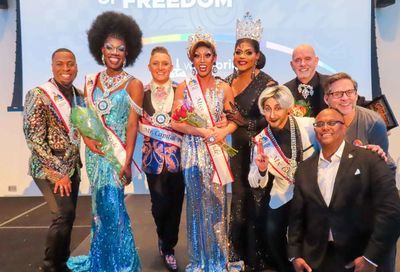FBI: North Korea responsible for Sony Pictures hack

Confirming what everyone had already suspected, the Federal Bureau of Investigation today announced that North Korea did indeed have direct involvement in the hacking of Sony Pictures in late November. The computer attack, which led to the theft and subsequent leaking of unreleased films, Sony Pictures employees’ emails and personal identity and other sensitive information, was launched in retaliation to The Interview, a Sony Pictures comedy starring Seth Rogen and James Franco which tasked the duo with entering North Korea undercover and assassinating the country’s despotic leader, Kim Jong-un.
In a statement, the FBI said that the attack, which infiltrated Sony’s servers, consisted of “the deployment of destructive malware … [which] rendered thousands of SPE’s computers inoperable, forced SPE to take its entire computer network offline, and significantly disrupted the company’s business operations.” So, pretty major then. Sony reported the attack to the FBI within two hours, and the two have been “working closely” throughout the investigation. The juiciest nugget of the statement, though, is the complete confidence the FBI has in naming North Korea as the instigator of the attacks — despite a group called “Guardians of Peace” claiming responsibility.
“The FBI now has enough information to conclude that the North Korean government is responsible for these actions,” the statement reads. Apparently, several factors led to this conclusion, including “technical analysis of the data deletion malware” which the FBI knows was developed in North Korea due to “similarities in specific lines of code, encryption algorithms, data deletion methods, and compromised networks.” Furthermore, the FBI noted that there was “significant overlap” in the methods and networks used in the Sony attack and “other malicious cyber activity the U.S. government” that had previously been linked to to North Korea. The final nail in the coffin? The tools used to attack Sony Pictures had similarities to a cyber attack against South Korean banks and media outlets, which the FBI know to have been carried out by North Korea.
“We are deeply concerned about the destructive nature of this attack on a private sector entity and the ordinary citizens who worked there,” the statement continues. “Further, North Korea’s attack on SPE reaffirms that cyber threats pose one of the gravest national security dangers to the United States.”
According to the Bureau, “North Korea’s actions were intended to inflict significant harm on a U.S. business and suppress the right of American citizens to express themselves,” with the department calling out the attack as falling “outside the bounds of acceptable state behavior.” The statement ends with the FBI promising to “identify, pursue, and impose costs and consequences on individuals, groups, or nation states who use cyber means to threaten the United States or U.S. interests.”
Strong words, indeed, but the FBI makes no mention of the fact that, in essence, “Guardians of Peace” and — more directly — North Korea have already won. The attack, spurred by anger from the North Korean government over the content of The Interview, successfully convinced Sony Pictures to pull the film from release and cancel any future plans to make it accessible in any format. Yes, there were legitimate concerns, with the hacking group invoking 9/11 rhetoric and promising repercussions and attacks should any cinema groups choose to screen the film. After most major chains reneged on their plans to show the film — despite there being no credible evidence to support the existence of a plot to attack cinemas — Sony had no choice but to pull the film entirely.
“In light of the decision by the majority of our exhibitors not to show the film The Interview, we have decided not to move forward with the planned December 25 theatrical release,” Sony Pictures stated this week.
Sony’s decision has been met with anger from Hollywood. Actor Ben Stiller tweeted: “Really hard to believe this is the response to a threat to freedom of expression here in America.” Writer and director Judd Apatow tweeted: “I think it is disgraceful that these theaters are not showing The Interview. Will they pull any movie that gets an anonymous threat now?” Late night host Jimmy Kimmel was particularly angry in his tweet, calling Sony’s decision to pull the film, “An un-American act of cowardice that validates terrorist actions and sets a terrifying precedent.”
What’s more, it’s already impacting decisions with regard to other films. Steve Carell and Gore Verbinski’s Hermit Kingdom, a paranoid thriller intended to be set in North Korea, has been dropped by studio New Regency after 20th Century Fox indicated that it wouldn’t release the film, Deadline reported.
The hacking also led Paramount to cancel any planned showings of 2004 comedy Team America, which featured North Korea’s former leader Kim Jong-il as a protagonist (complete with comically-gory death scene). Cleveland’s Capitol Theater, which planned to screen the film, tweeted that it had been canceled by Paramount Pictures, with a theater in Dallas — which replaced The Interview with Team America after the former was pulled by Sony — also confirming that its screening would not proceed.
Even the administration has waded into the debacle, with President Obama stating that Sony’s decision to pull the film from release was “a mistake.”
“We cannot have a society in which some dictator some place can start imposing censorship here in the United States,” the President said during his end-of-year news conference. “Because if somebody is able to intimidate folks out of releasing a satirical movie, imagine what they start doing when they see a documentary that they don’t like, or a news report that they don’t like.”
Obama also promised a response to the attacks. “They caused a lot of damage and we will respond. We will respond proportionally, and we’ll respond in a place and time and manner that we choose.” He continued by stating that, “It says something interesting about North Korea that they decided to have the state launch an all-out assault on a movie studio because of a satirical movie…. The notion that that was a threat to them, I think, gives you some sense of the kind of regime we’re talking about here.”
Sony, of course, was quick to blame its decision on the theaters pulling support for the film. “The decision not to move forward with the December 25 theatrical release of The Interview was made as a result of the majority of the nation’s theater owners choosing not to screen the film. This was their decision,” the studio said in a statement. “Without theaters, we could not release it in the theaters on Christmas Day. We had no choice.”
The studio also offered a glimmer of hope for anyone who still wishes to see The Interview, adding that they they are “actively surveying alternatives to enable us to release the movie on a different platform.”
“It is still our hope that anyone who wants to see this movie will get the opportunity to do so.”
Naturally, it was West Wing creator Aaron Sorkin who best summed up the entire situation. “Today the U.S. succumbed to an unprecedented attack on our most cherished, bedrock principle of free speech by a group of North Korean terrorists who threatened to kill moviegoers in order to stop the release of a movie,” the Emmy- and Oscar-winning writer said in a statement to the media. “The wishes of the terrorists were fulfilled in part by easily distracted members of the American press who chose gossip and schadenfreude-fueled reporting over a story with immeasurable consequences for the public — a story that was developing right in front of their eyes. My deepest sympathies go out to Sony Pictures, Seth Rogen, Evan Goldberg and everyone who worked on The Interview.”
Indeed, Mr. Sorkin.
Support Metro Weekly’s Journalism
These are challenging times for news organizations. And yet it’s crucial we stay active and provide vital resources and information to both our local readers and the world. So won’t you please take a moment and consider supporting Metro Weekly with a membership? For as little as $5 a month, you can help ensure Metro Weekly magazine and MetroWeekly.com remain free, viable resources as we provide the best, most diverse, culturally-resonant LGBTQ coverage in both the D.C. region and around the world. Memberships come with exclusive perks and discounts, your own personal digital delivery of each week’s magazine (and an archive), access to our Member's Lounge when it launches this fall, and exclusive members-only items like Metro Weekly Membership Mugs and Tote Bags! Check out all our membership levels here and please join us today!























You must be logged in to post a comment.